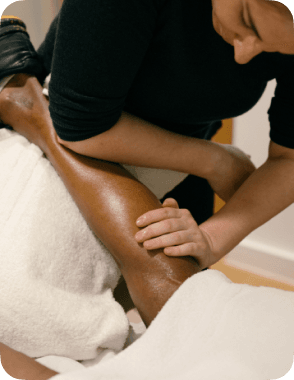Soft Tissue Therapy for Runners

Pure Sports Medicine
- 21 September, 2018
- Running
- Soft Tissue Therapy
- 2 min read
Running events require a huge volume of progressively taxing running. This volume over the months and years takes its toll on the musculoskeletal system. Soft Tissue Therapy is not just for maintenance, but also importantly for injury prevention!

Regular treatment means you can deal with niggles as and when they crop up, before they become injuries. An injury may cause the runner to have to take a break from training or stop altogether. Overload conditions become particularly prevalent as runners start to increase their mileage, whether this be in line with their training plans, but also if sessions have been missed due to illness etc. Often runners try to compensate for this and do too much too soon.
Common Issues Seen In Distance Runners
- PFPS (patellofemoral pain syndrome, i.e. runner’s knee); adductor overload; glute, hamstring, quad and calf tightness; and minor muscle strains.
- Neck, shoulder and back tension and pain can also be common, which may be due to posture or running style, but also stress and anxiety leading up to the event.
Benefits of Soft Tissue Therapy
- Help muscles recover post run and prepare them for their next run.
- Identify and deal with niggles that may lead to injury.
- Manage the increase in running frequency and endurance by reducing fatigue, tightness and shortening of tissue.
- Relieve stress and tension.
- Reduce pressure around joints and ligaments, including the spine.
- Relaxes mind and body pre and during race day which has an impact on the range of movement and performance.
Runners often say after a treatment that their muscles feel easier, lighter, and that they have more energy and less fatigue. And most importantly, they feel like they can run again!
We suggest that runners have a treatment weekly or fortnightly throughout training, but closer to the event as, training intensifies, runners will benefit from a weekly session.
A rest day is a good day for treatment to relieve tension. Most marathon runners tend to complete their long runs at the weekend so depending whether this is on a Saturday or Sunday, they may want to leave a couple of days before receiving a deeper massage treatment (if they just want a flush through their legs they can have it the same day or the day after).
Treatment before the big race needs to be scheduled 3 to 5 days before the race. The deeper the treatment, the longer it takes for the body to recover and respond, just like running workouts!
Receiving soft tissue therapy after the race will reduce fatigue and DOMS, and allow you to walk properly the day after and enjoy full passive stretching.
Runners often say after a treatment that their muscles feel easier, lighter, and that they have more energy and less fatigue. And most importantly, they feel like they can run again!

Advice
Over the last 20+ years our experts have helped more than 100,000 patients, but we don’t stop there. We also like to share our knowledge and insight to help people lead healthier lives, and here you will find our extensive library of advice on a variety of topics to help you do the same.
OUR ADVICE HUBS See all Advice Hubs

